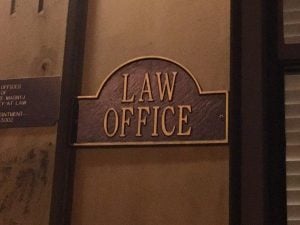An Interview With Solo Practitioner Erin C. Callahan
She shares incredible insight into what it is like to run your own practice and what it takes to do it successfully.
 This is the latest article in the monthly “An Interview With” series. In this series, I connect with people from all parts of the legal profession and at all stages of their legal career to learn who really makes up the legal community and what they are actually doing with their legal degrees.
This is the latest article in the monthly “An Interview With” series. In this series, I connect with people from all parts of the legal profession and at all stages of their legal career to learn who really makes up the legal community and what they are actually doing with their legal degrees.
This month I discussed solo practice issues with estate and small business attorney Erin C. Callahan. Erin is a 2011 graduate of SMU Dedman School of Law and currently runs her own practice in League City, Texas. In this article, Erin shares incredible insight into what it is like to run your own practice and what it takes to do it successfully.
KS: Tell us about your journey to becoming a solo practitioner and small business owner.

Is The Future Of Law Distributed? Lessons From The Tech Adoption Curve
EC: In law school, I planned to open my own firm. Famous last words. But then I received an offer that led me to take a 7-year detour in the insurance industry. After seven years, I was done and I went to work for a small general practice. I was exposed to almost all areas of the law — which is ideal if you don’t know what area of law you want to practice. I fell in love with estate planning, and I realized I didn’t like family law or litigation. Therefore, I decided to hang my own shingle and do what I love and what makes me happy.
KS: What do you love about running your own practice and being your own boss? Conversely, what are some challenges that come with being a small business owner?
EC: Running my own law firm is terrifying and exciting all at the same time. I love being my own boss because if I want to buy new software, I buy new software. If I don’t want to work on Friday, I don’t. The freedom and flexibility are invaluable. The biggest challenges are leveling up while still doing good work and running your business. You have to become an expert in marketing, finance, bookkeeping, sales, and so much more. It is challenging to keep all the balls in the air and projects moving forward so outsourcing is critical or you will fall behind. Another challenge is fear and mindset. Pushing yourself as a business owner is different than pushing yourself as an employee. As an employee, your development plan might include attending several conferences, meeting with a coach, or taking a new class. Your development plan as a business owner is taking on new business that you don’t have direct experience with; which can be scary. You have to stay on top of your fear and forge ahead otherwise you will be stagnant. I never experienced fear until owning a business. As Gandhi said, “Your beliefs become your thoughts, your thoughts become your words, your words become your actions, your actions become your habits, your habits become your values, your values become your destiny.”
KS: I know this question is a bit of a trap for business owners, but describe what your typical workday looks like.
Sponsored

How Generative AI Will Improve Legal Service Delivery


Navigating Financial Success by Avoiding Common Pitfalls and Maximizing Firm Performance

Is The Future Of Law Distributed? Lessons From The Tech Adoption Curve

Early Adopters Of Legal AI Gaining Competitive Edge In Marketplace
EC: It’s probably easier if I describe a typical week because I block my schedule. On Tuesday and Thursday, I am out of the office and I focus on all marketing events — whether that’s speaking engagements, meeting with referral partners (I meet with about 20 a month), or attending several local networking events. I am busy from about 8:00 a.m. to 4:00 p.m.
Monday and Wednesday, I am in the office drafting in the mornings and meeting with clients in the afternoons.
Friday is a free for all. Anything that doesn’t get done earlier in the week gets done on Friday. Usually, I am busy most of the day with drafting or meeting people.
In addition to the law firm, I own another small business on which I spend about 15 hours a week. Generally, from 4:00 to 7:30 p.m. Monday through Thursday, I am tutoring. I work with elementary and middle school students whose parents want them to get ahead in school, need confidence-building, or are struggling in class. It is a blast! It’s different than practicing law. My kids are amazing and every day no matter how bad my day is, I have to put a smile on and be there for them. I end every day laughing and having fun with the kids. I also believe in having multiple streams of income and this business is a second stream of income for our family.
KS: What drives your passion to practice estate planning and business law?
Sponsored

Early Adopters Of Legal AI Gaining Competitive Edge In Marketplace

Legal AI: 3 Steps Law Firms Should Take Now
EC: I love estate planning and small business law because I am working with people and not companies. I feel like I am making a difference in their lives. Most people don’t have an estate plan. It’s fun working with them and helping them develop a plan that gives them peace of mind. Second, lifestyle. I don’t have a heavy caseload of litigated cases. I can work whenever or wherever I want, and there is freedom in that. Estate planning and small business law align with my natural strengths. I am empathetic and I get my energy from people. I am also futuristic according to Strengthsfinders, so I naturally have a long-range view towards the future so it’s a good fit. Lastly, I love it because you can keep things simple and do basic wills or challenge yourself intellectually with Medicaid or other highly technical areas of law within estate planning and business law. There is room to grow.
KS: What advice do you have someone who is interested in starting their own legal practice?
EC: First and foremost, just do it! Take an hour every morning and plan out what it will look like for a few weeks. That being said, don’t stress about all the details. It doesn’t really matter what practice management software you buy. Clio, MyCase, or Practice Panther — they all get the job done. Make decisions quickly, and don’t succumb to analysis paralysis. Hire a CPA and bookkeeper early or at least have a clear plan. Make sure you put time into your marketing plan. Most lawyers think they will open the doors and they will come. That is not true. Lawyers are not natural salespeople, and as a law firm owner, you have to be fluent in sales. Lastly, understand that sales is different than being good with people. Know your ideal client and target market.
KS: What, if anything, did you do in law school that you found really helpful in preparing you for solo practice? In retrospect, is there anything you wish you had done differently in law school to be better prepared?
EC: To be candid, I don’t think anything in law school prepares you for opening your own law firm. Maybe working while in school or holding leadership positions does because you learn time management and organization skills. Other than that, take as many writing classes as you can. If your school has classes about running your own law firm or allows you to take business classes in the business school, definitely take those. Also, get as much work experience as possible, so by the end of law school you know what areas you enjoy and what areas you hate. Volunteer, work, offer to work for free — whatever it takes to get exposure to different areas of the law.
You can learn more about Erin here.
Know someone who would be great to profile in this series? Send an email to info@vincoprep.com with “An Interview With” in the subject line.
 Kerriann Stout is a millennial law school professor and founder of Vinco (a bar exam coaching company) who is generationally trapped between her students and colleagues. Kerriann has helped hundreds of students survive law school and the bar exam with less stress and more confidence. She lives, works, and writes in the northeast. You can reach her by email at info@vincoprep.com.
Kerriann Stout is a millennial law school professor and founder of Vinco (a bar exam coaching company) who is generationally trapped between her students and colleagues. Kerriann has helped hundreds of students survive law school and the bar exam with less stress and more confidence. She lives, works, and writes in the northeast. You can reach her by email at info@vincoprep.com.







